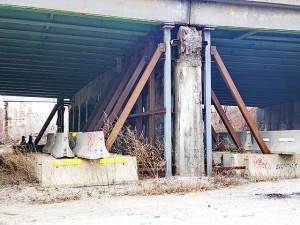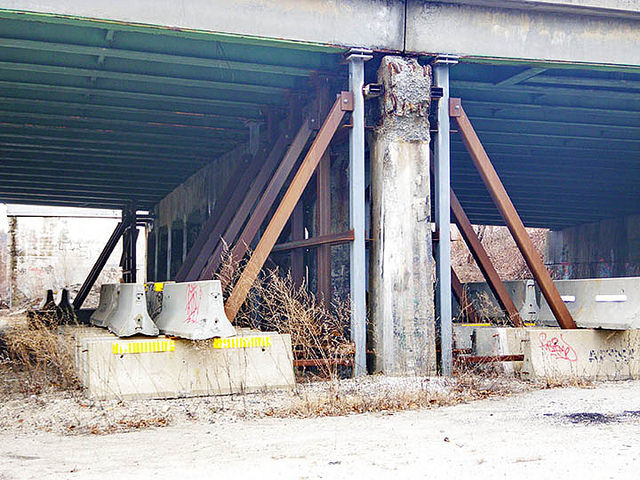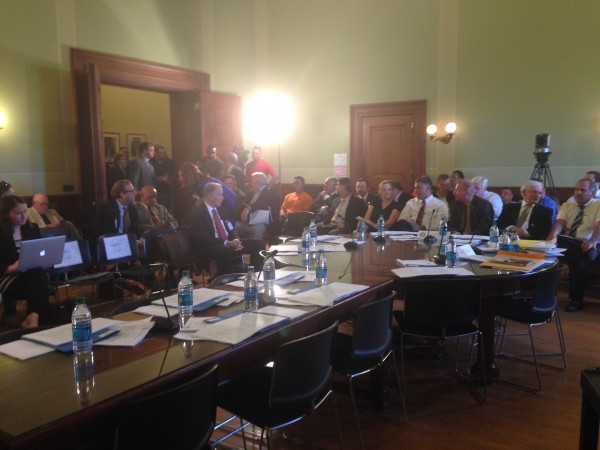
In an ironic twist of fate, the Rhode Island Department of Transportation closed the Park Avenue Bridge in Cranston the same day that the Senate Finance Committee and the Senate itself voted to uphold Governor Gina Raimondo’s ambitious Rhode Works legislation.
The $1.1 billion bill would be used to repair bridges and roads throughout Rhode Island, which have been ranked last in the country. Part of that money would come from a $500 million bond from the state to begin repairs on 17 proposed locations for tolls. RIDOT Director Peter Alviti has said in a House Finance Committee meeting earlier this week that the bond allows the department to use their own finances to begin repairing and reconstructing the rest of the bridges in the state.
The tolls, which would only charge tractor-trailer trucks, would reportedly make $60 million a year in revenue, which would also be used explicitly to repair roads. Opponents from the trucking industry and business community have railed against the tolls, saying that they will drive away business. Supporters have continually cited safety as their number one priority.
Safety was a particular issue today, as RIDOT closed the Park Avenue Bridge, even after being inspected in May, and several months prior to that.
“It is my professional opinion that this bridge is in imminent danger of collapse, and I am ordering its immediate closure,” Alviti wrote to the governor this morning, after it was found that the timber planks helping to hold the bridge up were “severely deteriorated and stressed from the weight of automobile traffic.”
Carlos Machado, the Division administrator for the Federal Highway Administration, concurred with RIDOT’s decision. House Speaker Nicholas Mattiello, however, called for an investigation of RIDOT and their decision to close the bridge, which is near Mattiello’s law office. He brought up questions regarding exactly who has been inspecting the bridges, and whether or not RIDOT has been doing their job effectively.
Speaker Mattiello has also not yet made a firm decision concerning the Rhode Works bill. While he has gone on record saying that he supports the bill as a whole, there are still portions of it that remain objectionable. Now that the Senate has voted to uphold the legislation in a 33-4 vote, the bill will move to the House, bringing Mattiello into center stage on the issue.
Even as the legislation moves forward, there are still those who continue to oppose Rhode Works with the hope that it will not go through this session. The National Federation of Independent Business expressed their opposition in a press release, calling on the General Assembly to “slow down” their toll proposal.
“Certainly Rhode Island’s roads and bridges are in need of repairs, however, thanks to the glaring lack of specifics regarding this toll plan, small businesses are left with concerns over the details,” NFIB Rhode Island State Director Bill Vernon said. “Until some of these questions are answered, it will be difficult for the small business community to have confidence that tolls are the right policy choice for Rhode Island’s economic future.”
The Rhode Island Republican Party has also gone on record saying that the governor’s plan lacks transparency, and is fiscally irresponsible.
“There are still many unanswered questions as to how this toll plan will impact Rhode Islanders, including the simplest of questions such as how much it will be or on what bridges it will be assessed. It is ridiculous to think politicians on Smith Hill would adopt a plan that calls for new tolls statewide and millions in debt with so little information,” state GOP Chairman Brandon Bell said.
These worries did not affect the Senate vote, though. After a unanimous vote in Senate Finance, discussion on did not take very long, as most lawmakers agreed that safety was their number one priority. Rhode Works was upheld in a 33-4 vote.
“I would hate if a member of any of our constituencies was a fatality or a casualty due to the atrocious conditions of our roads,” Senator Christopher Ottiano (R- District 11) said when showing his support for the bill.
After the vote, Senator Louis DiPalma, the first Vice Chairman on the Senate Finance Committee, gave details from his own personal experience about why the Rhode Works bill should pass.
“I’m originally from Connecticut, I’ve been here for about 30 years, and back in the 70’s, I believe it was, there was the Mianus River Bridge Collapse. We’re talking I-95, tractor-trailers, cars, over the edge. Many people died,” he said. DiPalma remembers that event and uses it to promote a preventative, rather than a reactionary, approach to the bill.
“I never do it from the perspective of ‘that could be us,’ I don’t look at it and say that’s going to happen here. I look at it from the perspective of ‘what can we do to act now so that never happens here,” he said. “It’s a safety issue. It’s an issue of money- we’ve gotten to this point because of lack of maintenance over decades. We didn’t get here overnight.”
DiPalma brings a second layer of fresh perspective to the bill’s consideration as an engineer.
“I try to look at things from a facts and data perspective. What’s given, what do I know, what are the facts, what can I infer, and how do I build from there,” he said. “I was confident with the facts and data that I read, with the presentations that were given, and how this proposal came together.”
The only remaining roadblock for the governor’s bill is the House, and Speaker Mattiello. Whether or not it can make it through before summer recess is the question on everyone’s mind, and a special fall session for the proposal becomes more and more likely as each day passes.


